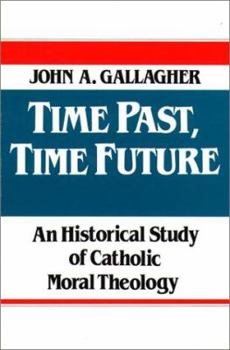Time Past, Time Future: An Historical Study of Catholic Moral Theology
Select Format
Select Condition 
Book Overview
No Synopsis Available.
Format:Paperback
Language:English
ISBN:0809131420
ISBN13:9780809131426
Release Date:January 1990
Publisher:Paulist Press
Length:278 Pages
Weight:0.95 lbs.
Dimensions:0.8" x 6.1" x 9.0"
Customer Reviews
1 rating
The Long Story of a Continuing Quest
Published by Thriftbooks.com User , 17 years ago
In my college days forty years ago the old joke ran something like this: the surest way to wreck a promising ecclesiastical career was to teach moral theology, particularly in a seminary. From what I see and read the same can be said today, as moral theology seems to be that particular point where Catholic Church authority has placed most of its chips in its efforts to rally the faithful and separate the orthodox wheat from the dissenting chaff. John Gallagher's overview of Catholic Moral Theology is in many respects a tale of that pesky conflict: the Cathedral versus the University, casuists versus probablists, deontologists versus relativists, traditionalists versus modernists. Gallagher for the most part restricts his study to the philosophical emergence of moral theology since medieval times. He is not prepared to underwrite the third century rite and theory of Penance nor, more surprisingly, the Irish monastic discipline of repeatable confession and its Penitentiaries as part of the organic development of moral theology. For Gallagher modern moral theology as an academic discipline was born of a viable philosophical system [as St. Thomas Aquinas put forward] and an ecclesiastical legal system [decretals and Canon Law]. These parameters frame eight hundred years of debate and development, and most notably the last five centuries which have come to be called "the manualist era," which many would argue extends into the present day. One of the overriding themes of this work is the University vs. the Cathedral. By this Gallagher means the differing ends of each institution. Medieval universities enjoyed the more glamorous task of probing the Scriptures, the ancient fathers, and the classical secular libraries in their quest to organize and systematize the material and the spiritual world. The Cathedral, specifically its ecclesiastical and legal scholars, was entrusted with the more practical but vital responsibility of salvific pastoral life. The universities produced summas, the cathedral decretals. This dichotomy would repeat itself in later centuries. Much of this work is devoted to the so-called Manualist Era, the product of the Council of Trent's [1545-1563] desire to increase the zeal of the faithful by means of fruitful sacramental participation. The first moral manuals were the product of primarily Jesuit seminary training and crafted a rational case-law approach for budding young confessors. But even the rigors of Jesuit discipline did not create an airtight uniformity. Controversies over free will, rigorousness, and laxity, led to a second generation of manualist thinkers. St. Alphonsus Ligouri highlights this period, noted for its humane approach to moral theory and practice, coupled with a strong emphasis on personal spirituality. Gallagher notes, however, that the controversies surrounding Probabilism at this time became somewhat self-absorbing [36]. The Enlightenment era with its emphasis upon subjective experience, coupled wit





